Inspiring Stories
Deb Bibbins

When Deb Bibbins retired from the insurance industry in 2013, she began serving as a board member for several Greater Hartford nonprofit boards. Around that time, she watched a family member struggle deeply with loneliness as his social circle shrank with age. Seeing him go through such a difficult period prompted her to dig into the research, and she found a vast body of overwhelming evidence linking loneliness to serious mental and physical health risks. She looked for a nonprofit that was actively addressing this growing public health crisis in Connecticut and was surprised to find none. After a period of soul-searching, she decided to take action and, in 2019, with the support of long-time friend, founded For All Ages, a nonprofit dedicated to connecting the generations and inspiring action to end loneliness, reduce ageism and improve mental, physical and social health. To date, their intergenerational programs and social health education initiatives have touched more than 38,000 lives – and they’re just getting started!
For All Ages also convenes The CT Collaborative to End Loneliness, a statewide alliance to foster social connection for Connecticut’s residents. Deb shares that she’s “learned that loneliness is part of the human experience and that none of us are immune to it. As human beings, we are wired for connection; it’s as essential to our well-being as food and water.” She says that loneliness arises when the quality or quantity of our social connections doesn’t meet our needs, whether for a moment or over time.
“What’s inspired me most is realizing that we have the power to change that. By taking small, intentional steps — like reaching out, asking how someone’s really doing and truly listening — we can not only transform someone else’s day, but also strengthen our own sense of belonging. That awareness has changed how I live my life, by making connection a daily practice, not just a value.”
One of For All Ages’ most powerful and impactful stories happened at an adult living community during an intergenerational art program. A woman who had been grieving the loss of her spouse – and self-isolating for months – heard laughter coming from the common room. Children and residents were painting together, sharing stories and enjoying each other’s company. She quietly opened her door, stepped out of her room and sat down nearby. When she was invited to join in the fun, she gently declined, saying she just wanted to watch.
The next morning, the Executive Director of the community called and said, “You will not believe the impact your program had on one of our residents. We’ve been leaving meals at her door for months – she wouldn’t open it for anyone. But this morning, she came to breakfast for the first time in ages. She joined us at lunch too. Her whole demeanor has shifted. She told me, ‘Grief will always be with me, but now I see what I’ve been missing and that it’s time to start moving forward.’”
That moment reminded Deb of the quiet power of intergenerational connection. It also reinforced a lesson she carries daily: we rarely know what burdens others are carrying, and a little kindness and connection can truly change a life. She shares that human connection is essential to our health and well-being. Yet loneliness is quietly fueling a wide range of serious health and social issues, including heart disease, stroke risk, type 2 diabetes and dementia, as well as rising rates of anxiety, depression, suicidal ideation, domestic violence and gun violence. This growing public health crisis touches people of all ages and walks of life, often in ways we don’t immediately see.
“Each of us has a role to play. Whether it’s checking in on a neighbor, sharing a meal or simply listening with intention, small acts of connection can change lives. And beyond what we do individually, it is vital that we advance and back programs and initiatives that strengthen human connection – across generations, in healthcare settings, in workplaces and throughout our communities. Doing this will not only support individual well-being, it will also help build a healthier, safer and more resilient future for all of us.”
Giving back to her community has always been important to Deb. It’s a role that not only draws on what she has done in the past, but also continually challenges her to grow – especially through the incredible people she has the privilege to learn from every day.
Deb lives in Simsbury with her husband, whom she met more than 40 years ago at UConn. They both love being outside and enjoy exploring local trails with their spirited rescue pup, Bailey, leading the way. When she’s not leading For All Ages, she finds peace in nature, balance through yoga and a lot of pride in watching her daughter pursue her Doctor of Physical Therapy degree at UConn.
211 Snapshot: Aubree

As the months passed, Aubree managed to cobble together a few part-time jobs, juggling shifts at Staples and Subway by day and at a gas station at night. She started to see a therapist. But her depression just wouldn’t lift.
Then one November day, a Staples customer got nasty with Aubree, shouting – the customer cocked her head, poised to spit on her. Aubree broke down, utterly defeated. “I felt like a waste of space,” she says.
The therapy wasn’t helping. The drinking was out of control. The future looked bleak. She called her best friend, who worked in the Department of Social Services. “Call 2-1-1,” her friend suggested.
For three days, Aubree would dial 2-1-1, then hang up, overwhelmed. Her friend came over, called 2-1-1 on speakerphone, went into the next room and closed the door.
That day, Aubree took her first step toward healing: when a 211 Contact Specialist answered the call, Aubree shared her story.
You’re okay, Aubree remembers hearing. On the other end of the line was a caring, kind and reassuring person. “She let me know that I just needed to find help. And I’d taken the first step.”
The Contact Specialist understood that addressing Aubree’s addiction needed to be the top priority. Given how readily available alcohol was where she lived, she knew Aubree needed to change her environment, or no solution would be reached.
The Contact Specialist connected Aubree with support groups, a shelter for people struggling with addiction and a program to help her afford food – and provided locations, hours and phone numbers to make her way forward clear and accessible.
In the days that followed, Aubree moved back in with her mother and started working on her sobriety, turning to 211 almost daily for support, resources and information to help her identify her next steps.
As she found her footing, her confidence grew. She found employment at a bank, securing a steady income, expanding her skill sets and laying the foundation for career growth. She fell in love. She became a mother.
Five years later, she has completely turned her life around.
“211 pulled me out of a dark place,” Aubree states. “Each time I reached out, there was a patient person there to listen and figure out the next steps. They not only helped me – they helped me prepare a better world for my daughter to grow up in.”
Now, Aubree has a new job, where she “can give back and help people, just like I was helped” – she is now an Eligibility Services Specialist at United Way of Connecticut.
211 Snapshot: Jeff Papuga
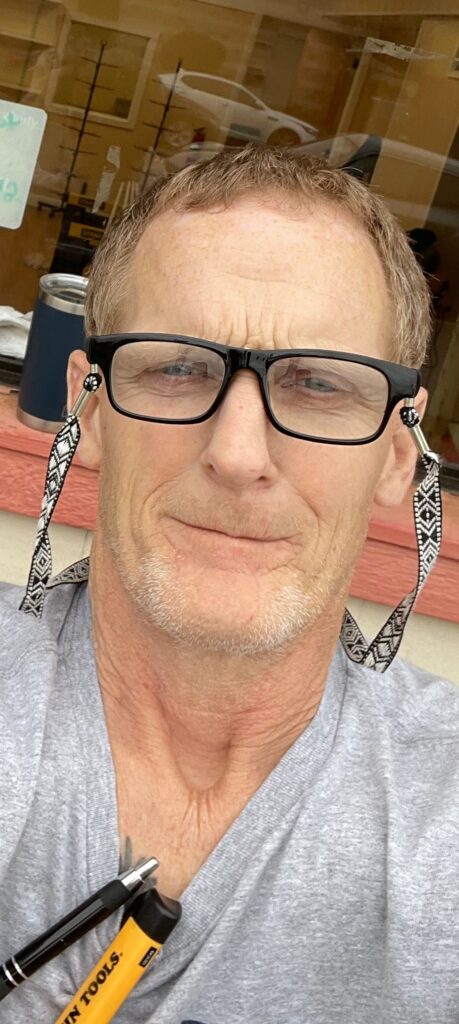
For nearly eight years, Jeff Papuga has worked to help others every day: he’s the Electrical Maintenance Technician at Columbus House, a New Haven nonprofit that advocates for and creates affordable housing to end homelessness. Jeff is responsible for the upkeep of the six Middletown apartments that provide emergency housing for families in crisis. When he’s on the job, he often refers folks to 211, so they can access information and services to help them begin to thrive again.
But at different points in his life, Jeff himself has needed help – and has found it through 211. After his marriage ended, he struggled to find housing and dialed 2-1-1. A Contact Specialist listened to his situation, determined what benefits were available to him and helped Jeff find a home. When his rent went up suddenly, a 211 Contact Specialist explored his options and connected him with a rental assistance program – and when his electric bill skyrocketed, Jeff reached out again and found the support he needed.
Jeff describes reaching out to 211 as “easy,” and he admires 211 Contact Specialists’ expertise – and dedication to understanding people’s needs and connecting them to the right resources and programs. “They explain everything so you understand what your next steps are.”
He’s thankful for his job, his home and the opportunity to help others every day – just as 211 has helped him. “These people do their jobs well,” he says. “Every time, they go above and beyond.”
211 Snapshot: Meghan Slater

In 2006, Meghan Slater suddenly faced a new reality: without warning, she became a single parent to her three-year-old child.
College-educated, working full-time at an above-minimum-wage job, Meghan did everything she could to provide for her family.
But it wasn’t enough.
Each month, she struggled to pay rent, afford childcare and cover basic necessities. “I was doing everything ‘right,’ but I couldn’t make ends meet,” she says. “I am not alone in this experience. The reality is that anyone can face unexpected hardship at any time. Financial hardship is not about making bad choices — it’s about an economy where wages don’t keep up with rising costs of housing, food and child care.”
At her lowest point, Meghan had to make an impossible decision: no longer able to afford housing in Middletown – where she had built a life and support system – it seemed her only option was to move to Georgia to live with her mother. The move would force Meghan to enter her child into one of the worst school districts in the country – and to walk away from an incredible job with a wonderful employer.
Recalling an advertisement from a United Way workplace campaign, Meghan dialed 2-1-1 – and changed her life.
211 connected Meghan to resources that helped her apply for local moderate-income housing, find child care support and secure energy assistance to get through a harsh winter. These services provided more than temporary relief; they gave her the stability she needed to keep her job, care for her child and build the foundation for a bright future here in Connecticut.
And in the 19 years since she called 2-1-1, Meghan has given back to her state. She works, pays taxes, volunteers, gives to her local United Way (Middlesex) and contributes to the economy — all because she was able to access the right resources at the right time.
211 helped Meghan turn her life around – so much so that she helped her mother relocate from Georgia to Connecticut to be closer to the family.
Meghan is grateful for the help she received – and proud of all that she has accomplished. She’s also passionate about advocating for state investment in 211 and educating others about 211’s vital services. She states, “Every Connecticut family deserves the opportunity to work and build a future here.”
Fanny Rodriguez

Fanny and her husband live in Bethel and are parents to three children. Fanny had always thought about owning her own family child care center. She worked for twelve years as a full time CNA in a nursing home. It was a secure job and the thought of leaving it felt too risky, until she was forced to leave for medical reasons.
She began looking for other work, but with three young children, she and her husband quickly realized that the cost of child care would far outweigh the benefits of her potential income. “At the time, my youngest was 10 months old, the middle child was three and the oldest was seven. All three of them needed care, but everywhere I went it was so expensive.” Her husband suggested she stay home with the kids, and he would work two jobs to make up the difference financially. But Fanny soon became restless and bored and knew it was time to make her dream a reality.
She first reached out to her family and recruited her cousin’s child as her first client – offering him a significant discount. Word of mouth spread, more of her family’s children joined as clients, and the rest, as they say, is history.
With five kids in her care, Fanny decided to formalize her business and pursue her family child care license. While her husband was skeptical about rocking the boat, Fanny was referred to All Our Kin, a national nonprofit based in Connecticut that trains, supports and sustains family child care educators. Once she successfully received her license, she reached out to 211 Child Care to be trained to accept clients who participate in Care 4 Kids, a program sponsored by the Connecticut Office of Early Childhood that helps low-to-moderate income families pay for child care costs.
Fanny receives a lot of support from other child care providers in the community, as well as from United Way of Coastal Western Connecticut’s Cora’s Kids program for continuing education and professional development – and from participating in our Staffed Family Child Care Network (SFCCN) through the hub at Team Inc. Through Team Inc., Fanny earned her Child Development Associate (CDA) credential. And within that hub of 126 community providers, Fanny leads a committee of 85 Spanish-speaking child care providers.
Being in this community of support with providers who experience the same things I do is so important. They understand what I do and what I’m going through. We’re there for each other as sounding boards, and we’ve become like family. And having the availability of local training is critical.
It’s a tough business, and there are struggles. “I have families who don’t qualify for Care 4 Kids because they just miss the eligibility requirements. The requirements don’t take a family’s expenses into account. Expenses like rent, mortgage, insurance, utilities are sky high. Once those bills are paid, these families barely get by and live paycheck-to-paycheck. I make exceptions for parents, and that is a struggle for me.”
Care 4 Kids is amazing. Without Care 4 Kids a lot of people wouldn’t be able to go to work.
Fanny considers herself successful. She is licensed to care for nine children and is always at capacity – all by word-of-mouth, with no advertising investment! And, she has a vision for her future: she has applied for a Women’s Business Grant to expand her business and plans to participate in the Parent Leadership Training Institute (PLTI), with a special focus on children with special needs.
I used to work as a CNA with the elderly, and now I’m doing the same thing, but the other way around – from watching the end, to watching the beginning. I am so passionate about this work because there is so much we can contribute to these kids and their futures that will make a difference in their lives. That keeps me motivated and excited. If we can do the right thing for these infants and toddlers and impact their early education, they can have successful futures.
Fanny’s own children are now 10, 13 and the oldest, 18, is in college. She has been a family child care provider for almost 10 years. What advice does she have for folks interested in child care?
- Don’t do it for the money. You must be invested in this business.
- Taking care of kids this age isn’t passive – it’s not about them sitting around and coloring – it’s a lot more than that.
- Be sure you have the passion, patience and vision to do this work.
Rafael Cruz

Rafael and his daughter Naraliah live in Danbury. During his divorce, he was eager to learn how to co-parent effectively, so he proactively looked for resources and found Saint Joseph Parenting Center’s Dads Are the Difference Program (DAD) – the National Fatherhood Initiative’s evidence-based 12-class curriculum that emphasizes the importance of the father in a child’s life.
Rafael shares his story and what he learned in the parenting program:
“Naraliah is nine years old, and I’ve been there since day one, since the day that she was born prematurely at four pounds and seven ounces. It’s been an amazing adventure.
Going through the divorce process, I found that CT focuses the best interest of the child more in favor of the mom than the dad. I understand that. But when there are two parents involved there’s always different opinions about what’s in the child’s best interest.
The court tends to suggest a minimum parenting requirement in a divorce agreement, but for me, I wanted more. The most important thing to me is that our daughter can see that both her parents are communicating and that both spend equal time with her: pickups, drop offs, emergency situations, school, her education, when she gets sick, her activities.
As a father, I’m trying to enjoy every little moment possible. The obstacle I’m facing right now is having equal time with Naraliah. I’ve learned through the DAD program that if both parents have equal time with their child, it will benefit the child’s growth and development and is in the best interest of the child.
So, my focus is to change and grow and better myself for the people around me and to be an exemplary dad for my daughter. My daughter’s mom perceives me in a certain way, and I can’t change her reality. She believes that equal time could negatively impact our daughter’s stability, so I’m in the process of filing a modification to our court orders.
I have to present evidence, and I need to continue to show consistency, do everything I can to communicate effectively and respectfully and suggest alternative solutions. For me, this means finding ways to spend more time with my daughter. What I learned from DAD is to keep my eye on the prize, which for me is my daughter, her well-being and her happiness.
At the end of the day, no one can take away the growth and progress that I’ve made. Regardless of how I may be perceived, I know the truth and the progress I’ve made to get to where I need to be today. My goal is to continue to be the best person I can be for myself, the best family member for the people I love and the best dad for my little girl, so that I can positively contribute to her growth.
My parents are still together. My dad was mostly the worker, and my mom was the one who pushed and challenged me. When I had my daughter, I committed to going above and beyond in challenging and appreciating her and in communicating with her about what’s right and what’s wrong.
Naraliah is very open with me, and we have a great relationship. She is adventurous and loves to try different things, participate in outdoor activities, go to the park and the pool and ride her bike. I recently took her ice skating and to see the Christmas tree in Rockefeller Plaza. She is also very artistic: she loves to draw, all arts and crafts, puzzles and making bracelets together. She’s been taking piano lessons once a week since she was three/four years old.
My daughter is also a good student: she loves math and reading, and I help her with her homework (either in person or through FaceTime), and together we plan to begin reading the Diary of a Wimpy Kid series. I like to challenge her to read more and to think about what she is reading and learning.
She has a great sense of humor, loves to help people and she wants to be a teacher when she grows up. Naraliah also enjoys going to church with me, where I am an usher – she loves to help me collect donations, and that makes me feel so proud and honored.
I want other single dads with kids to know they should never give up. Always focus on growth and when there’s a challenge that doesn’t land in your favor, learn from your mistakes and try to come up with a better solution next time. If it doesn’t go your way, it’s okay – focus on and enjoy the moments you have with your child. There’s a positive way to fight for what you believe in, regardless of anyone else’s opinion. As a dad, fight to be a better person, to spend more time with your children, because time is very valuable. I don’t want to wait until my daughter is 16 or 17 to spend time with her when these moments, right now, are the most precious moments in her life.
I’ve learned so much from my counselor at DAD; I don’t know where I would be without him and our one-on-one sessions. In the class I learn so much from other dads who are also on this co-parenting journey. Even though I finished the program, there are other co-parenting classes to attend, and I am currently taking those classes so I can learn more. I highly recommend participating in a fatherhood program and to seek out other resources, like family counseling, a therapist, etc.”
Ann Dagle
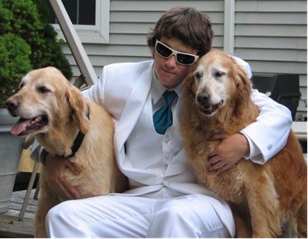
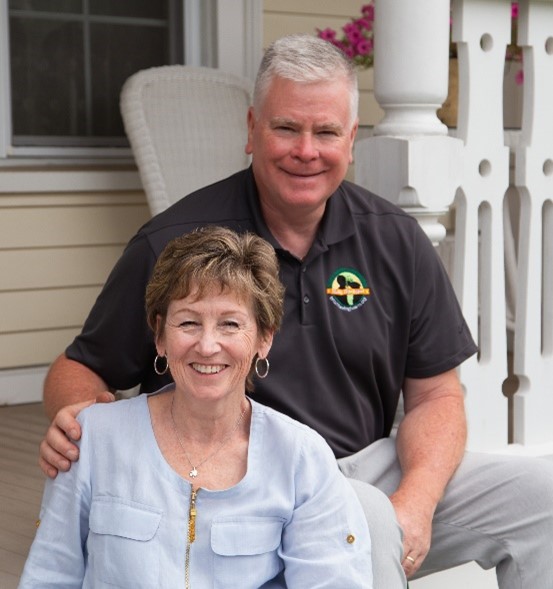
“In 2011, my life as a mom of three boys, with very different personalities and who were transitioning into young men, was far from perfect. But one thing was sure: they all knew how much they were loved by their parents, their large extended family and so many friends.
I think this was especially true for Brian, the youngest of the three. His charismatic personality, sparkling blues eyes and sensitive soul melted many hearts.
Brian lost his life to suicide in November of his sophomore year at Castleton University in Vermont. I equate Brian’s death to a tsunami that hit my family, friends and anyone who was blessed to have known him. Everyone questioned, ‘How could something like this happen to a family that seemed to be so loving and connected to community?’
In the weeks and months following Brian’s death, life was a blur. Grief was exhausting, isolating, physically and mentally painful. I struggled to find a reason to live but my focus turned to my surviving sons. I needed to always keep them close by and spoiled them with anything they needed.
I also became fixated on searching for other mothers like me. It felt like my grief left me alone on a deserted island. I needed to find other loss survivors. Sadly, I found them — moms who lost children to suicide but also to tragic accidents. They understood. We talked, we walked, we cried and shared about our kids without judgement, silly cliches or advice we did not need. I also discovered the benefits of a grief support group for survivors of suicide loss. Twice a month on Friday nights, we shared our similar stories and found ourselves saying, ‘Me too, I feel the same way.’
For our family and Brian’s friends, the landscape of our lives was undeniably changed. My family of five suddenly became a family of four. Each person’s grief was uniquely their own – mother, father, brother, aunts, cousins, roommates, neighbors – their relationship with Brian was special based on every life he touched. Years later, I cherish the stories from people who I never knew but who were touched by Brian’s kindness.
The next few years, the roller coaster ride of emotions was overwhelming. The ups and downs of grief were relentless. The dance between two steps forward and twenty back left me feeling confused, lost, frightened and unsure of my place in the world. I wondered when I would ever find solid ground.
As I reflect on my journey, the year 2014 was a pivotal time in my healing. It was when I could finally fully embrace the long road ahead of engaging in the grief work that would be necessary to my healing. Until that point, I could only survive but I knew I needed and deserved more than that, to maybe even thrive.
Without a real plan, mission or any ideas on what we wanted this to look like, in 2014 my family and I opted to give purpose to the unimaginable pain we experienced and start the Brian Dagle Foundation.
Businesses, friends and people we didn’t know stepped forward to help us organize fundraisers. 2014 was the first year of the Niantic Jingle Bell 5K, our biggest fundraiser. It has grown to one of the top 5K’s in the state, with more than 1,500 registrants, raising more than $100,000. I learned to share my story, Brian’s story. I learned that his story did not end when his life did.
I educated myself by attending suicide prevention trainings. I received a certification in Grief and Death Studies to support anyone grieving the loss of someone and became a QPR (Question, Persuade, Refer) certified trainer (just like CPR, QPR is an emergency response to someone in crisis and can save lives) to teach others the signs I did not see. I’m sure I gained as much healing in helping others as they received from me. But it was so hard. It was hard to be so vulnerable about my story, about Brian, about the darkest times in my life, but it was my way to honor Brian, and still is today.
In 2018 one of our greatest accomplishments in this journey was opening Brian’s Healing Hearts Center for Hope and Healing. At the Center we offer HOPE to hundreds of adults grieving the loss of a loved one from any loss: spouses who’ve lost the loves of their lives to disease or an accident, bereaved parents who’ve lost a child tragically to accidents, illness, drug overdoses or suicide. It’s a safe place to feel connected and understood by others who are also on this journey.
Now, almost 13 years after Brian’s death, we’re celebrating ten years of incredible accomplishments at the Brian Dagle Foundation and Brian’s healing Hearts Center for Hope and Healing. I’ve learned to hold joy and sadness together: I hold the joy for my beautiful family and fulfilling life, and I hold the sadness for the cost it took to get here.
The tragic loss of Brian has led us to this work. He is my reason. Together we make a difference in the world one person at a time.”
Alyeska Tilly

“My mental health suffering began in 8th grade, coinciding with puberty. I had low self-esteem, felt self-conscious, suffered from self-hatred and was frequently in a negative mood. I felt negativity toward myself, school and the world.
I didn’t realize these were symptoms of depression.
In high school I started having panic attacks, and sophomore year I began self-harming. I was active on social media and on Tumblr. It was there that I began seeing posts about general anxiety and panic attacks and, for the first time, I was able to put names to my feelings: depression, suicidal thoughts, anxiety, self-harm.
So now I had the names, but what could I do about it? For me, I experienced constant intrusive thoughts that changed the way I viewed the world and the objects in it. It wasn’t like I had anything planned out, these thoughts showed up as disturbances in my everyday life. For example, I would be walking down the stairs at high school and think about throwing myself down them. Or, if I approached a crosswalk in the street, I would think about throwing myself in front of a car. At the same time, I was on my high school’s varsity swim team. No one would have ever guessed or noticed that I led a secret life or noticed the scars that I sneakily hid under my swimsuit.
I was scared to talk about my feelings for fear of the outcome, and I didn’t want to disappoint my wonderful parents who gave me a good childhood – I wanted to protect them from feeling that they had failed.
I had been struggling for a long time. I was lucky to be able to confide in friends who related to me and were also struggling with similar issues and on social media communities.
During the last two years of high school, I experienced my first boyfriend and my first breakup. My first boyfriend didn’t relate to having mental health struggles or the nuances that come with them and didn’t really know how to support me. I had been wanting help for a long time but didn’t know what to do. I also always had this overbearing feeling that my problems weren’t serious or ‘bad enough’ to seek professional help.
During our breakup, it became obvious that I needed professional help, but I knew I couldn’t do it without my parents or the support of another adult. It wasn’t until my mom found my college essay I had left in the printer that she discovered what I had been hiding. It was then that I was finally able to admit how much I had been struggling. At first, she was apprehensive; I was swim team captain, president of after-school clubs, had good grades, tons of friends and hobbies, how could I be depressed? How could I be thinking about suicide? It took a couple of tough conversations, but eventually she came to understand and helped me book my first therapy appointment.
I went to therapy for a year before I started college. It helped me to understand the root causes of what I was going through and better understand myself. Unfortunately, therapy fell by the wayside when I started college at Southern. Telehealth didn’t exist at the time, and I was reluctant to go to the school clinic, thinking that my problems weren’t as great as others’, that someone else needed those spaces more than I did. But, through the deep reflection techniques I learned in therapy and tips others shared on social media, I created a mental ‘toolbar’ of skills I could use that helped me cope with my struggles. For example, when I start to feel a panic attack coming on, I use the 5, 4, 3, 2, 1 grounding method:
In the room right now, name:
- 5 things you can see
- 4 things you can hear
- 3 things you can feel
- 2 things you can smell
- 1 thing you love
I also find the Calm Harm app for self-harm and the Reframing Negative Thoughts technique very valuable.
[It’s important to note that although social media was helpful to me in many ways, it could be a harmful and toxic place too, showing images of self-harm and encouraging eating disorders. While it’s important that we keep social media a common and sacred meeting space for young people, we also need to make it safe by ensuring that proper and evidence-based messaging and resources are available.]
From early high school, I knew I wanted to be in the mental health field and help change the system, make it more accessible and help people like me. I centered my college essay around my favorite quote from Brené Brown: ‘One day, you will tell your story of how you overcame what you went through, and it will be someone else’s survival guide.’
I earned my bachelor’s in psychology and later, my master’s in social work, focusing on community organizing and policy.
Even though I was healing and had a great college experience, I still had my ups and downs. Mental health is a life-long battle. I think there were many things that contributed to my mental health issues: puberty and hormones (which I hope we do more research around), environmental and social factors, etc. But the most important thing I realized is that we never need a ‘reason’ for struggling with mental illness or suicide. It can affect anyone. This understanding helped my healing journey. Instead of struggling with suicidal ideation multiple times a week, I struggle maybe two times a year. I now have the skills to recognize what’s happening and help me get through it.
If you are or have a teenager, I hope that by sharing my story you take away these nuggets:
- There are probably many people in this world who do not understand you, but trust that there are also so many who do, you will find them.
- Therapy and resources are not a one size fits all, it’s about finding what works best for you as an induvial, and that may take time.
- No, our mental health system isn’t perfect, but it is improving every year, every month, every day, and there are people like me who have been where you are, who are working hard to keep making it better.
- Even when it doesn’t feel like it, there ARE resources and people out there available and able to help you.
- Everyone’s support system looks different, some people find support in their parents, some find support in friends, co-workers, online communities. Wherever you find it, it’s important to have healthy – support and connection.
- You are not alone.
- It’s sometimes hard to believe people when they say it gets better – I sure didn’t believe it when I was younger. It’s hard to believe because the healing process and life in general are like a roller coaster. The truth is that you may dip many times during healing. It’s a push and pull process that isn’t as simple as going to therapy one day and suddenly feeling ‘cured.’ I still have bad days now, but I used to have only bad days; now most of my days feel good, and happy and free.
- Healing is not about needing to feel 100% but feeling even 10% better than you felt at the darkest times. That matters and deserves to be celebrated. You are important; that 10% is important. 100% is a hard expectation to put on yourself or others. Even people who do not struggle with mental health issues do not feel 100% every day. You are human, it’s okay to not be okay.
- Even though struggling with mental health is a very negative experience, there are some positives that can come out of it. I gained so many skills in empathy and resilience, I built a career for myself from my experience and found my life’s passion.
- You may be fighting a demon that is nasty and strong but know that you are stronger. You can do this. Don’t give up. Stay strong. The roller coaster ride of life is worth all the ups and downs that come with it.”
Thank you Alyeska for sharing your experience, strength and hope with us.
Dita Bhargava
In 2018, Dita Bhargava lost her oldest son, Alec, on his 26th birthday to fentanyl poisoning while he was living in a sober home in Canaan, CT. Since his passing, Dita has been working on creating awareness and erasing stigma.
Dita is a mental health advocate and a member of our UWCT Board of Directors. A former electrical engineer with more than 25 years in the finance industry, Dita has actively dedicated her career to advocate for people living with mental health and substance use disorders.
We invite you to meet Dita and hear her story by watching this video.
Jamie McDonald
Jamie personifies dedication to both quality and the community. His community focus includes a commitment to hire people who have been involved with the justice system and raising their minimum wage in 2016 to $15 an hour for “non-tip” employees. Jaime also supports many local charities. He is an integral part of Operation BBQ Relief, delivering the healing power of BBQ to disaster-affected communities (like victims of Hurricane Katrina and flood victims in Texas) and World Central Kitchen, where he cooked and provided food for Ukraine refugees in Turkey.
This week we’d like to introduce you to Jamie “The Bear” McDonald. Jamie is the owner of the Bear’s Smokehouse franchise. A competitive eater and bodybuilder, he opened his first restaurant in South Windsor in 2013 with winnings from a competitive eating contest.
But Jamie’s story, like many of ours, runs much deeper. In 2022 he shared his story with Mental Health Connecticut, hoping it might help someone else take whatever steps they might need to get help. “Jamie wants people to know that sometimes what you see on the outside is not at all what’s going on inside. He knows this because for decades he tried to put a good face on depression, anxiety, trauma, and ultimately, alcoholism. It didn’t work.”
Warning: This story contains thoughts of suicide ideation!
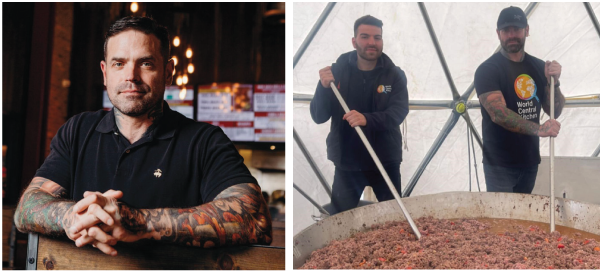
“I’m very open about this and hope it helps people to see,” he says. “Part of the problem is the stigma around it and that people think they have to hide it out of shame or judgment.”
“From outward appearances my life was fantastic,” he adds. “People would say everything is sunny in Bear Country.” That only added more pressure to look the part, Jamie says. “What do I have to be depressed or unhappy about? So, you push it down and keep a positive face.”
Jamie’s issues began as a child. He grew up in a family with physical and mental abuse. He also experienced sexual abuse from a stranger. For a while he tried to compensate by being hyper-focused on things like mountain biking and bodybuilding. He was also an overachiever at work. “I’ve always had an addictive personality,” he says of his various temporary obsessions. “But it was all just trying to shut down my mind from thinking about the trauma stuff or the black hole inside me.”
“No matter how many awards you get, it makes you feel better for a second but then it’s back to the depression and anxiety and not feeling like you’re good enough, no matter what anybody says,” he says.
Before starting Bear’s Smokehouse, Jamie worked for United Technologies Corporation (UTC) after leaving the Navy. He married and had a son and daughter. In order to deal with increasing anxiety and depression, he began drinking more.
Restaurant life made drinking easy. “I could drink as much as I wanted to,” Jamie says. “I went from a single pour of bourbon at the end of the night to well over a bottle a day within 8-9 months. I would drink all day at work and then drink at night until I passed out. I was doing it to shut off my brain and stop having these thoughts.”
This went on for about a year, Jamie says. “During that time my depression was getting worse and worse and worse.” He separated from his now ex-wife. “I lived alone so I didn’t have to worry about anybody’s judgment. The kids were not exposed to it.”
When booze didn’t do the trick, Jamie added Ambien to the mix, which only made his depression worse, he says. The nadir came one day when he was in his basement with his dog, Bernie. “I was crying to myself. I would tell Bernie I can’t do this anymore. I’m so tired,” he says. That night he got out his gun and put it in his mouth. “The only thing that saved me was the thought that no one knows where I am and Bernie’s going to get hungry and eat me. That’s what stopped me from pulling the trigger that night. I reached out to my ex and said I need help.”
Jamie spent two months at a rehab facility going through various therapies. Today he has been sober for five years and counting.
Aware that recovery is “always a work in progress,” Jamie has made speaking out about his life as much of a mission as making award-winning BBQ. Well aware of the second chance he’s been given in life, he offers second chances to others, like working in Ukraine to help feed refugees. He is also involved in Linked4Life, a nonprofit dedicated to raising awareness about mental health issues and suicide prevention.
And he remains committed to telling his story. “The shame is part of what drives the cycle,” he says. “You don’t have to be ashamed. As a community leader, I’m comfortable sharing with you all and I hope this lets you know you can, too. More people are coming out about their own struggles. Hopefully down the road we can treat mental illness just like any other illness or injury.”
Mara Wolff
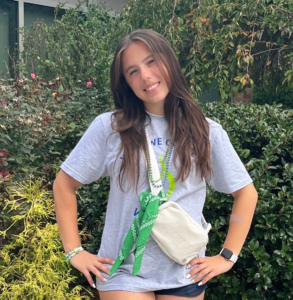
Mara just graduated from East Lyme High School and is headed to the Gabelli School of Business at Fordham University. She shares that she is “over the top excited to be in Lincoln Center and Manhattan!” But life has not always been this happy and hopeful. Mara bravely shares her story:
Growing up, my family had such high standards for me. Both of my parents immigrated from communist Romania in the early 90s and they pushed me beyond my limits. This environment led me to overwork and push myself, more than my parents wanted me to. I became a perfectionist, setting a plan for my future and needing to follow it. But there were many obstacles to this “perfect” plan I had crafted.
I have had severe anxiety since I was little. I never knew how to manage it until I started counseling in 7th grade. This anxiety set me back: my grades weren’t as high as I wanted them to be, and I wasn’t a good test taker.
For my freshman year of high school, I transitioned from a small private school with a class size of 30 to a school with more than 250 students. Being in a new town with no friends was not easy at all. I became severely depressed, was diagnosed with OCD and developed anorexia. I was being force-fed, stuck in an inpatient treatment facility with no time to myself. All the plans I had made were falling apart. My friends were volunteering and catching the sun at the beach while I cried at home, looking at a glass of orange juice.
One night, everything became too much. I was depressed, anxious about the upcoming school year and angry about treatment. I was so emotional that night: screaming, crying and throwing things. I couldn’t take it. I thought I had no future. I couldn’t endure the pain I was going through to get better. I didn’t see a finish line to my recovery. I couldn’t endure everyday life after everything I had been through.
I vividly remember grabbing a sharp object and attempting suicide. But I couldn’t stand seeing my own blood running down the sides of my leg. I put the object down and hid in my closet — the one place I felt safe, in this dark corner of my house where I felt reality didn’t exist.
I was so hurt and lost. I grabbed my phone and dialed the suicide hotline. I was so antsy waiting for the contact specialist to pick up. What could this person do for me? Why was I calling them? But I can’t stress enough how glad I am that I did. She saved my life.
Sitting on the phone, she made me feel safe. She guided me through techniques to calm down and helped me realize the bigger picture in life. I have never been more thankful to someone than I am to the contact specialist who spoke with me that day.
It has been more than two years since that phone call. Two years of me finding myself and my purpose. And I am so happy I am still here today. I have so much hope for my future: going to college, advocating for various mental disorders and having many people around me who love me – the people I hadn’t noticed two years ago.
If this journey has taught me one thing, it’s that I have the strength to do anything. I wake up every morning excited about what the day has to offer. I’ve gained so much strength through self-reflection and realize I can tackle any daily challenge and can grow from it.
Gizmo

In FY22, the 211 Mental Health Crisis Team handled 146,776 crisis calls. These calls represent a 16% increase over FY21 and comprise 42% of all calls to 211.
So, what does this have to do with Gizmo, you ask?
Gizmo, the narrator of Gizmo’s Pawesome Guide to Mental Health, is a therapy dog. For the past 12 years, he has been comforting people when they are feeling sad, mad, or worried and, through his Pawesome Guide, provides school-aged children with the tools needed to manage their mental health. But Gizmo is aging and in 2023 is preparing to retire with a farewell retirement tour.
We took some time to speak with Gizmo as he reflects on the impact of his work and his upcoming retirement.
Gizmo shares that “I work in schools a lot. So, I see lots of kids and I love all those kids a lot! I bet I would love every kid in the whole wide world a lot! So that’s why I’ve used my platform to advocate for mental health, especially for children.”
“Let me tell you about one of the most profound experiences I’ve had as a therapy dog/mental health advocate. One time I was at that big high school walking down the hall. Mom thought we were going to the office, but I had other plans. As we turned a corner, we saw a girl we hadn’t met before. She was all by herself and crying softly. As soon as I saw her, I stopped at her feet and would not budge. She dropped to the floor right away to be closer to me and said, “Gizmo, I knew I would find you today!” (That’s when I jumped into her lap.)
She told us this was her first day at our school and that she had just moved here all the way from Ill..Illa…Illanoise. Then she opened her almost empty backpack and pulled out the only item in it: a copy of Gizmo’s Pawesome Guide to Mental Health. She explained that her former teacher gave it to her because she knew the move to CT was super hard for her, and that she might feel sad, mad or worried about it.
The student told me she didn’t even know I was in Connecticut, much less inside her new school. So, I pawtographed her book. Then I made sure she got connected with lots of trusted adults. That’s super important to help kids do that!”
When we asked Gizmo about being a public figure and an influencer with nearly 200,000 followers, he explained to us that his followers on Facebook call themselves ‘Gizmo’s Big Army of Frens.’ “Those people are all so kind and loving! I told my mom I wanted to have a page of love and compassion, that’s all…because I’m a dog, and that’s all I am made of! These wonderful people from all walks of life who follow my page are the real influencers, though. They influence me to believe in the goodness of humanity. I’m one lucky dog to love and be loved by this army of very kind frens!”
“When I retire, I will miss all those excellent people I visited. I snuggled with people of many different beliefs, different backgrounds, different cultures, different ages, and different reasons for needing or wanting a therapy dog like me. You know what we all had in common? Love. I will not miss the love, though. I carry it in my heart forever.”
“In my retirement I’m most looking forward to my mom taking care of me. And by taking care of me, I mean taking me out for ice cream! I’ll even let my baby brother, Gadget, come along!”
“To all the people of Connecticut I want to say thank you so very muchly, frens! I love you for being you, ok? I hope you love yourself for being you, too!”
Gizmo’s Pawesome Guide to Mental Health© is a social-emotional learning curriculum, currently being used in 20 Connecticut schools, that gives kids the tools to manage their mental health. The Guide and Curriculum help kids learn:
- Mental health is as important as physical health.
- How to identify when mental health needs attention.
- Daily activities and healthy coping strategies that
- support mental health.
- How to identify and connect with trusted adults.
The curriculum was developed, with the support of federal grant funding, by United Way of Connecticut and key state agencies including the Departments of Mental Health and Addiction Services and Children and Families, the Suicide Advisory Board, and other dedicated partners. Learn more at https://www.gizmo4mentalhealth.org.
Roberto Gonzalez
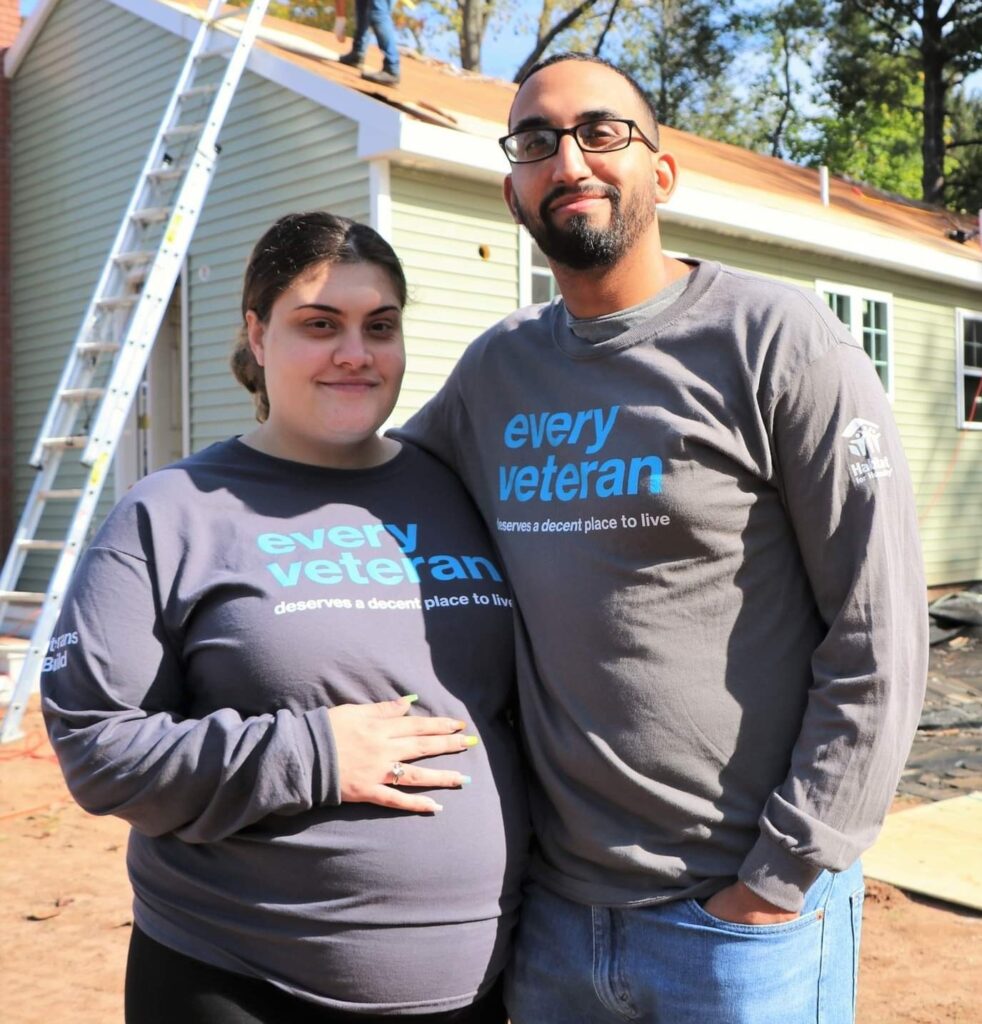
Roberto Gonzalez is 25 years old and proudly half Dominican and half Ecuadorian. After graduating from high school in his hometown of Bridgeport, he quickly realized that he was not quite ready for college and enlisted in the U.S. Army. He spent four active years in Oklahoma working on the cannon crew and as a field artillery member. While on active duty he married his wife Julia and became a father to his first child.
Roberto’s job required a lot of tedious work and heavy lifting and didn’t lend itself to transitioning to a “real-world” job. The onset of the pandemic affected his ability to explore new positions within the Army and made raising his son in isolation very difficult. He shares that “one of the biggest lessons I learned was being able to appreciate my family. It was my first time being away from home and that gave me the opportunity to mature and grow as a person.” But once his contract expired, Roberto was ready to return to Connecticut.
Anticipating the difficulty of being able to find affordable housing, before Roberto and his family returned home, they reached out to Middlesex Habitat for Humanity of CT, Inc. and applied to their Veterans Build program – a program that works to provide homeownership opportunities to current military and veterans of all service branches. The program partners with homeowners who are service members working to build a better life for their families. Roberto’s family lived with Julia’s parents in Naugatuck while they completed their 350 hours of sweat equity on their new home in Middlefield. The Gonzalez family gratefully moved into their new home in May of this year.
Roberto is a full-time student at UConn Waterbury, exploring the fields of Information Technology, Computer Engineering and Finance. He also raises his children and takes care of them while Julia is at work and studies respiratory therapy full-time. Roberto’s GI benefits help pay his school expenses and provide a basic housing allowance. He also receives disability benefits for the toll his job took on his body and his mental health. And like some veterans, Roberto and his family participate in as much public assistance as possible, like WIC and SNAP. Five percent of Connecticut’s financially insecure veterans received Supplementary Security Income (SSI) and 17% participated in the Supplemental Nutrition Assistance Program (SNAP).
Roberto shares that it’s “important to have a plan, whether you stay in active duty or get out. We had a pretty decent plan – we have a house, go to school and raise our kids with lots of love and appreciation. The end game far outweighs all the stuff I’ve ever been through.” And because he wasn’t able to completely give up on his dream of serving in the military, Roberto is currently enlisted in the National Guard, and is being re-classed as an IT Specialist to better align with his interests.
Hear directly from Roberto and learn more about ALICE Veterans by checking out these news clips:
Steve MacHattie

Steve MacHattie, LCSW and Owner of the Charter Oak Family Center in Manchester, has lived experience – he began experiencing suicidal thoughts and survived his first suicide attempt when he was six or seven years old. “I remember being in my bedroom alone. I had a suicide plan that I thought would work and I tried to carry that plan out. After some amount of time, I realized what I was doing wouldn’t work and went downstairs to find my mother. The conversation I had with her, which simply dismissed my experience as a childish incident, was just the beginning of a battle with depression and suicide that would last for decades.”
Steve began his journey of recovery, little by little, with the help of those around him. He shares that his “struggles with my illness resulted in my illness often being my first reaction to life. If I had a bad day or week, depression was right there to remind me who I was. I feel like I internalized the stigma of mental illness from those around me. Even as things were going better and I progressed in my recovery, I still held myself back. I spent years, literally, hiding from people. My need to hide started when I was a child, though it gained strength as I got older.”
Shortly after Steve’s father passed away, he was struggling with suicidal thoughts while driving to a meeting. He pulled over and called 211 because “I needed to connect with someone who cared.” In a moment when he thought no one cared, he said the contact specialist who answered his call was patient, not rushed, really listened and cared. “Being able to talk through it helped me feel less anxious and angry. Having someone listen decreased my suicidal urges. She reminded me that there were still things in my life I wanted to do – that I had a future with hope and goals.”
Having experienced 211 as a lifeline, Steve, now a clinical social worker, pays it forward by sharing his experience, strength and hope with his clients and by referring them to 211 when in crisis.
Steve says that faith and hope are an important part of his story, and he isn’t hiding any longer. He joined a suicide prevention board, specifically, the Board’s lived experience committee. He’s taking singing lessons, and he puts himself up front and center teaching at the college level and loves it.
According to Steve, “Mental illness may be chronic, but it does not have to be terminal. We can still accomplish great things. Life comes with challenges, stresses, sorrows, even successes. Life is full of surprises, and I don’t have to allow those surprises to define me or stop me. My hope is that by talking about mental illness and my struggles with mental illness, I will help open a door that others will be able to walk through. I also hope that people with mental illness can learn to not judge themselves as harshly as I have been known to do.”
If you are struggling and need crisis and suicide prevention assistance, call 211. In Connecticut, 211 is the point of entry for all crisis intervention in Connecticut (988, National Suicide Prevention Lifeline [1-800-SUICIDE or 1-800-273-TALK (8255)], the Department of Mental Health and Addiction Service’s “Action Line” (1-800-HOPE-135) and the Youth Mobile Crisis Line through Connecticut 211.